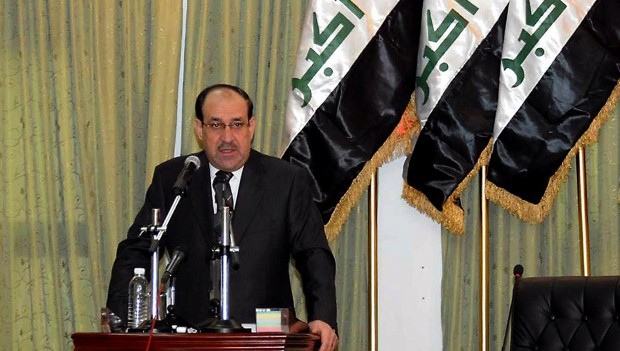I don’t believe that there is any need to reiterate the criticisms of Iraqi Prime Minister Nuri Al-Maliki’s performance, not to mention the huge number of opportunities that he has missed to lead Iraq to safety.
Such criticisms are well-known. However, to be objective, we must not blame all of Iraq’s current mistakes and misfortunes on the man. Iraqi’s youths are beset by a number of historic issues and ills. These can be dated back to the era during which the country was under British mandate, not to mention independence from British rule, the monarchist era, the republican era, and later the harsh Ba’athist era. This included both the reign of Abdul Salam Arif and later Saddam Hussein, which encompassed the invasion of Kuwait, international isolation, and then the occupation of Iraq itself and execution of Saddam Hussein. Following this, we saw the the establishment of a political system based on sectarianism as a result of the stupidity of the Americans, the cunning of Tehran, and the disunity of Iraq’s Arab neighbors.
Nuri Al-Maliki can therefore be viewed as the natural product of Iraq’s history, with all its ills. His discourse and actions are also a prime result of this.
In spite of all this, a fair and impartial observer cannot help but acknowledge that Maliki demonstrates determination and possesses a clear vision. More recently, the Iraqi prime minister has also begun to take increasingly direct and clear positions, unlike many regional politicians; this includes his interpretation and position on the Syrian war. This is something that was clear to see in his previous interview with Asharq Al-Awsat editor-in-chief, during which he warned against backing the Alawites into a corner, asserting that desperation grants courage. In Maliki’s most recent interview with the Associated Press (AP), he warned that a victory for Assad’s opponents will only serve to incite sectarian wars in Lebanon and his own country, create a new sanctuary for Al-Qaeda, and destabilize the region as a whole.
Maliki told AP: “If the opposition is victorious, there will be a civil war in Lebanon, divisions in Jordan, and a sectarian war in Iraq”
Admittedly, Maliki’s words are direct and to the point, and perhaps anger many of those who support the Syrian revolution against Bashar Al-Assad, and I include myself in this category. However we must avoid becoming too emotional, for he was correct in some of what he surmised, or at least close to being correct. The signs of this civil war are clear to see in Iraq and Lebanon. This is all the result of clashes between a dictatorial regime that has chosen to focus on security solutions and inciting sectarian strife, and an opposition that is insistent upon confrontation until the bitter end, making huge sacrifices despite everybody forsaking them.
However this does not negate the fact that the “cowardly” American and European reading of the Syrian situation from the very beginning, and the lack of any real support for the Syrian revolution, ultimately served to force the Syrians to dance with the devil in order to protect themselves from the butcher Bashar Al-Assad and his criminal gang.
As for the impact of this on neighboring Iraq and Lebanon, this is only natural. In addition to this, Maliki and the Shi’ite alliance’s discourse and gambles in Iraq in terms of promoting the Iranian story about the situation in Syria are crystal clear. It is enough to observe the “practices” of Iraq’s Shi’ite blocs towards the Syrian crisis. The situation is even clearer in Lebanon, and Hezbollah—with its fighters, discourse, and media, not to mention Hassan Nasrallah himself—is standing shoulder to shoulder with the Assad regime. So why should we not expect a similar response from Nuri Al-Maliki? Particularly when we are talking about an ailing region that suffers from historic ills that are too easy to exploit and incite.
Maliki is confident in his vision to incite the crisis, however he has failed to continue to read the situation and see how others view him and the role that he is playing in this sad drama.

Trackbacks/Pingbacks